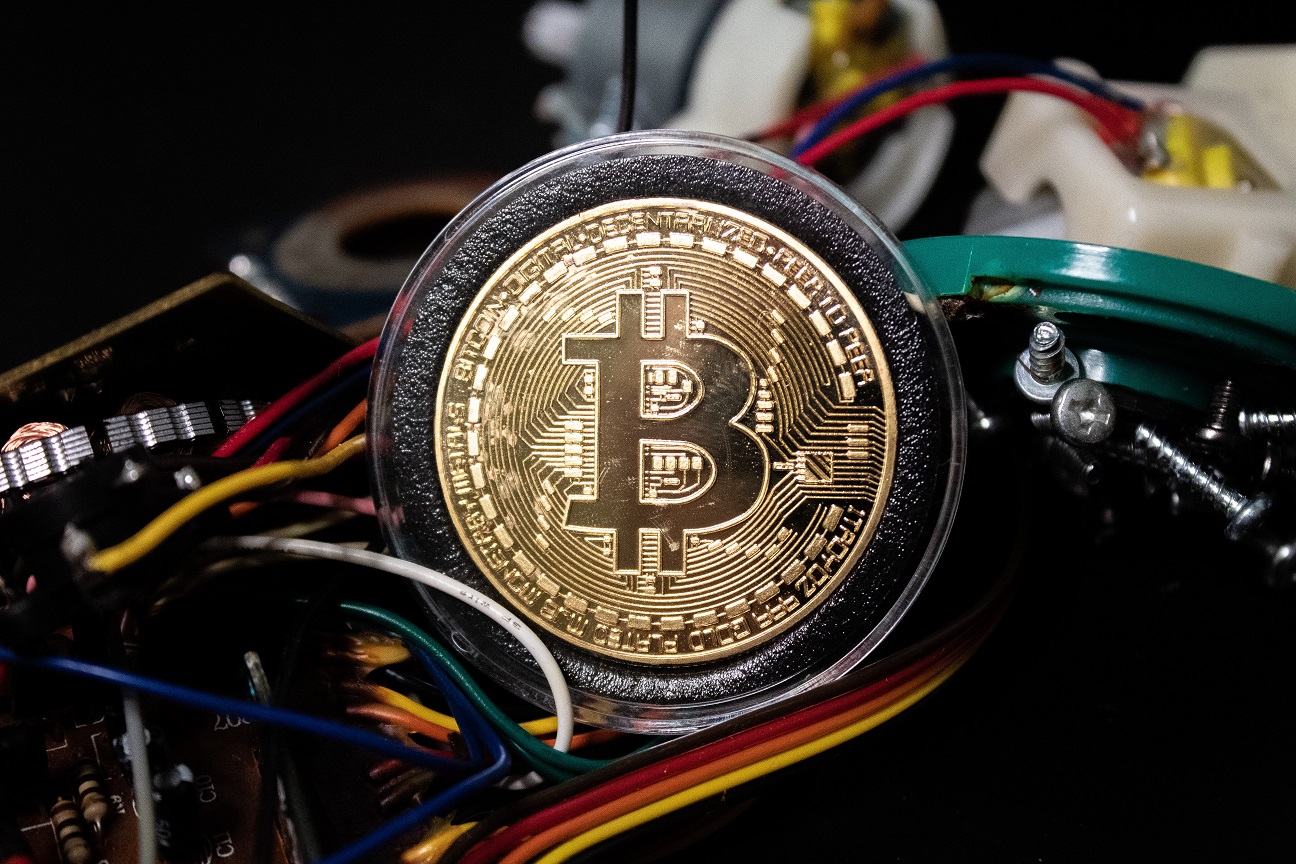Altcoins News
Bitcoin 7-Day Hashrate Down As US Storm Disrupts Miners

Data shows the 7-day average Bitcoin hashrate has now fallen to lows not seen since September, as blizzards temporarily disrupt miners in the US.
Bitcoin Mining Hashrate Has Shown Wild Fluctuations Recently
The last few days have seen extreme cold-weather conditions across the US, causing power and road-related disruptions, as well as claiming the lives of at least 37, as per a report. Even the BTC hashrate has felt an impact from this winter storm. The “mining hashrate” is an indicator that measures the total amount of computing power currently connected to the Bitcoin network.
When the value of this metric goes up, it means miners are bringing more machines online on the blockchain right now. Such a trend shows miners are finding the current network attractive to mine on. On the other hand, decreasing values of the indicator suggest some miners are disconnecting their rigs at the moment, possibly because they have been facing low or no mining profits on the chain.
Now, here is a chart that shows how the 7-day moving average value of the Bitcoin hashrate has changed over the past year:
The 7-day MA value of the metric seems to have sharply dropped off recently | Source: Blockchain.com
As the above graph shows, the 7-day MA Bitcoin mining hashrate has observed a significant decline during the last couple of weeks. This drawdown was initially caused by a 3% increase in the mining difficulty (which caused some miners who were already on the verge of going underwater to ditch the network), but the fall has extended in the last few days due to the storm.
The reason these recent freezing temperatures have had an effect on the hashrate is that BTC mining companies in places like Texas, where the power grid was put under immense pressure, made the decision to switch off their rigs in order to divert energy back into the grid so that the residents could get constant heating in their homes.
“Due to extreme cold weather sweeping across the eastern and southern half of the US, we will be participating in multiple power curtailments to help stabilize the electrical grid. BTC production is expected to decrease during this time,” tweeted Core Scientific, one of the biggest mining firms, on Friday.
It seems the disruptions may have now ended as the daily hashrate has spiked back, retreading the plunge. The below chart displays this trend.
Looks like the hashrate is back to its average | Source: Blockchain.com
If mining companies don’t face any other outages in the coming days, then the 7-day hashrate should recover back to previous levels.
BTC Price
At the time of writing, Bitcoin’s price floats around $16,800, up 1% in the last week.
BTC continues to consolidate | Source: BTCUSD on TradingView
Featured image from Brian Wangenheim on Unsplash.com, charts from TradingView.com, Blockchain.com
Altcoins News
Shiba Inu: Celebration for the Burning of 176 Million SHIB in a Historic Transaction

In an exciting development for the Shiba Inu community, September 20 marked a significant milestone as Shiba Inu’s official burn tracker announced that over 176 million SHIB tokens had been burned in a single transaction. But that’s not all; in the last 24 hours, a total of 135,933,606 SHIB tokens were burned, adding up to an impressive total of 521,814,163 tokens burned in just 7 days.
Impact on SHIB Price
As expected, this exceptional event has captured the attention of the cryptocurrency community and Shiba Inu investors worldwide. In the latest hourly update provided by Shibburn, the current price of the meme coin stands at $0.0000073, with a slight 0.15% decrease in the last hour. Although there has been a 1.34% decrease in the price in the last 24 hours, Shiba Inu’s market capitalization remains strong, valued at $4,297,527,749.
Lucie: The Voice of the Shiba Inu Community
On September 18, a key member of the Shiba Inu team, known as Lucie, addressed the community to answer burning questions about the highly anticipated SHIB token burn in Shibarium. Lucie emphasized that token burns are scheduled per transaction, meaning they occur based on the level of community participation. In a passionate plea, she urged SHIB holders to support this effort, stressing that SHIB burns are the result of close collaboration between developers and the community.
Lucie also pointed out that while it’s exciting to see enthusiasm for token burns, it’s crucial for the community to understand that SHIB burns are a community-driven initiative and not a call for developers to take immediate action.
Shibarium’s Focus: Strengthening BONE ShibaSwap
Amidst this backdrop of token burns, the Shibarium team has shifted its focus to strengthen the Bone ShibaSwap token, also known as BONE. Lucie emphasized that the implementation of BONE aims primarily to safeguard the interests of investors. To achieve this goal, the team has implemented a temporary locking contract along with a decentralized multi-signature wallet, ensuring maximum protection for Shiba Inu investors.
Shibarium’s Success with NOWNodes
Recently, Shibarium achieved an impressive feat by processing over 7 million RPC requests for the network in just one week. This achievement sets a new record for the platform and underscores the growing importance of Shibarium in the cryptocurrency ecosystem. NOWNodes, a node service provider supporting more than 80 blockchain networks, reported on this noteworthy accomplishment, highlighting Shibarium’s increasing relevance in the world of cryptocurrencies.
The Shiba Inu community is excited about these recent developments and the massive SHIB token burn, further bolstering their confidence in the project. With Shibarium gaining momentum and active community engagement, the future of Shiba Inu appears bright in the world of cryptocurrencies.
Altcoins News
Crypto Enforcement Funds Under Scrutiny: Congressman Emmer Calls For Restrictions On SEC

In a recent statement, Congressman Tom Emmer, a prominent figure in the GOP and a staunch advocate for crypto, expressed his concerns regarding the actions of Securities and Exchange Commission (SEC) Chair Gary Gensler.
Emmer accused Gensler of abusing his authority, leading to the expansion of the Administrative State while “disregarding the interests of the American people”.
To address these concerns, Emmer plans to sponsor an appropriations amendment aimed at restricting the SEC’s use of funds for crypto enforcement until clear rules and regulations are established.
Emmer Advocates For Clear Rules In The Crypto Industry
Emmer’s criticism of Chair Gensler centers on what he perceives as the weaponization of taxpayer dollars. Emmer argues that Gensler has utilized his position to further centralize regulatory control without ensuring a transparent and regulatory-friendly environment for the crypto industry.
By proposing to restrict the SEC’s funds for digital asset enforcement, Emmer seeks to emphasize the need for clear guidelines that protect both investors and innovators in the crypto space.
Addressing Senator Elizabeth Warren’s stance on cryptocurrencies, Emmer refers to her as a “control-freak senator” with an inclination towards centralized control.
He suggests that Warren favors a government-owned banking system and desires to retain the centralized power that comes with central banking. Emmer acknowledges the importance of central banking’s role but emphasizes the need for its evolution to adapt to the 21st century.
Emmer further asserts that attempts to suppress digital assets and cryptocurrencies are futile. He cites China’s unsuccessful ban on mining activities as evidence that even authoritarian regimes struggle to control decentralized technologies.
Emmer believes that a country like the United States, which “cherishes freedom”, cannot impede the progress of digital assets and cryptocurrencies.
The congressman’s remarks shed light on his perspective as an advocate for the crypto industry and his concerns regarding regulatory overreach. Emmer emphasizes the necessity of clear and balanced regulations that foster innovation while protecting investors.
By sponsoring an appropriations amendment, he aims to use the legislative process to ensure that the SEC’s enforcement actions align with well-defined rules and regulations.
As Emmer’s proposed amendment gains attention, it reflects the ongoing debate surrounding crypto regulations in the United States. The crypto industry seeks regulatory clarity to foster growth and innovation, while regulatory bodies like the SEC aim to protect investors and maintain market integrity.
Finding the right balance between oversight and innovation remains a key challenge, and Emmer’s efforts contribute to shaping the future of crypto regulation in the United States.
It remains to be seen how Emmer’s appropriations amendment will progress through the legislative process and how it will be received by his colleagues.
As the nascent industry continues to evolve, the role of Congress and regulatory agencies in establishing a clear and balanced regulatory framework will be crucial for its long-term success and widespread adoption.
Featured image from iStock, chart from TradingView.com
Altcoins News
US Forces Young Hacker To Forfeit $5.2 Million In Bitcoin

Last month, Ahmad Wagaafe Hared, a young hacker based in the United States, was ordered to forfeit approximately $5.2 million worth of Bitcoin (BTC), Stellar (XLM), and a BMW sports car to the government. According to a report, this order was made last week due to Hared’s involvement in a SIM-swapping scheme that targeted crypto executives in North California and the Bay Area.
The Bitcoin SIM-Swapping Hack
The SIM-swapping scheme, orchestrated by Hared–who went by the alias “winblo” — began in 2016 and was stopped by local authorities in 2019.
Hared and his accomplices obtained their victims’ contact information before entering a plea agreement with law enforcement agencies. They would then contact cellphone service providers, manipulating company representatives into believing they were the legitimate owners of the targeted phone numbers.
After that, they swapped cards, illegally taking control of their victims’ phone numbers. With this scheme, the hacker gained unauthorized access to their victims’ email and other crypto accounts before transferring coins.
The success of this scheme is evident in the significant amount of assets ordered for forfeiture. Hared must surrender 119.8 BTC, valued at $5.2 million, and 93,420 XLM, worth $11,770. A 2017 BMW sports car, believed to be proceeds of crime, must also be surrendered to the state.
The young hacker has been under arrest for over three years now. As mentioned, in 2019, Hared entered a plea agreement, though many case documents remain sealed, and the deal has not been disclosed to the public. Hared will be sentenced in January 2024 after pleading guilty to conspiracy to commit wire fraud.
According to details, this case is tied to another SIM-swapping scheme, which saw the indictment of Anthony Francis Faulk, also known as “shade,” who pleaded guilty to conspiracy to commit wire fraud in 2019.
Hackers Have Stolen Over $200 Million In 2023 Alone
In a recent report, blockchain intelligence firm Chainalysis claimed that hackers linked to North Korea have stolen over $200 million worth of cryptocurrencies to finance their nuclear weapons program.
In August, Lazarus Group said to be sponsored by the North Korean regime, was linked to the $34 million CoinsPaid hack. They were also reportedly behind the Stake.com hack, the FBI claims. The hit on the crypto casino saw over $40 million of coins robbed.
As part of their activities, hackers employ several tactics to steal Bitcoin and coins, including SIM-swapping, phishing, supply chain attacks, and infrastructure hacks.
Feature image from Canva, chart from TradingView
-
Opinion2 years ago
XRP: FOX Business Senior Correspondent Says SEC Is Losing Its Lawsuit Against Ripple
-
Tutorials3 years ago
How to Earn, Farm and Stake CAKE on PancakeSwap with Trust Wallet
-
Altcoins News3 years ago
Projects with ongoing migration from Ethereum to Cardano
-
NFT3 years ago
CardanoKidz: The first NFTs arrive at Cardano
-
Tutorials3 years ago
How to set up a Bitcoin node: beginner’s guide
-
NFT3 years ago
SpaceBudz: new astronaut NFTs on Cardano
-
DeFi News3 years ago
Uniswap vs PancakeSwap: Full analysis
-
DeFi News3 years ago
Liqwid Finance the first DeFi project on Cardano: everything you need to know

















